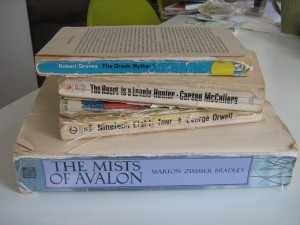This is the first in a series of posts that I will write occasionally—when I can’t think of writing anything else—about some of my favorite writers, my literary influences I guess you could say. The first on this list—though by no means my ultimate favorite writer, as it seems impossible to me to have only one favorite writer—is James Baldwin, since I will be leading an online discussion of his first novel, Go Tell it on the Mountain, as part of a Goodreads group I started called Literary Fiction by People of Color.
Strangely enough, considering how many Ethnic Studies classes I took in college, I have just recently discovered James Baldwin as a writer. The first time I read his work was when I bought a copy of Notes from a Native Son many years ago. It’s Baldwin’s first collection of non-fiction essays, titled in response to Richard Wright’s novel, ‘Native Son’, one of the seminal texts of the Harlem Renaissance and of African-American literature overall. I have to say, I didn’t take to Baldwin’s non-fiction very readily. Perhaps it seemed too dated to me at the time, although now when I go back and read it I can see how we can still draw lessons from it even today.
So I left Baldwin alone for a long time after that, convinced that he was one of those ‘great writers’ that I just didn’t like. It wasn’t until Chris Abani recommended I read ‘Giovanni’s Room’, Baldwin’s second novel, while I was in workshop with him at VONA a few years ago that I gave Baldwin another try. I loved Giovanni’s Room, and learned a lot from it about writing. It’s a perfect gem of a book, and Baldwin was only 32 when it was published, and already a literary sensation.
I’ve always identified with writers who pushed the envelope of what was socially acceptable to write about at the time, and Baldwin is a shining example of a writer who challenged conventional values by writing gay or sexually ambivalent characters long before this was seen as socially acceptable, even in literary circles. (Some might say it’s still not very socially acceptable to do so, but all things are relative).
He also wrote about race and gender relations, with a stylistic subtlety and precision that I’d venture is yet to be matched. And not only did he write about controversial topics, but he did so with such elegance and technical control, with such compelling emotional weight that the controversial aspects of his work would, over time, seem to me almost background notes to his literary mastery. To narrowly categorize any writer as merely ‘Black’ or ‘Gay’ or ‘Female’ is often an act of ignorance, but to do so to a writer like Baldwin is almost a literary crime.
Feel free to join the Goodreads discussion if you’ve read the book before, or if you’re interested in reading more literary fiction by people of color. The group is 300+ members strong now, and reads a different book every month. Hope to see you there.

Recent Comments